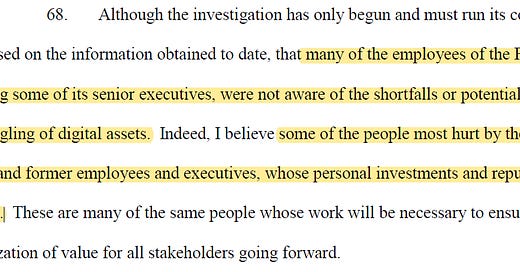
I (like most of the financial and nonfinancial world!) have been obsessed with the FTX collapse. And for good reason: the story is wild (and I wonder if the new CEO is playing into the drama a bit)! I just cannot believe a company could be valued at tens of billions with basically no oversight / internal controls / a payment submission method where supervisors approved disbursements with emojis.
I’m an admitted crypto skeptic (I wrote a piece asking what happened if crypto blew up last year, and the genesis for that piece was in part sparked by how dismissive SBF was off tether being a fraud in a very old Odd Lots Episode). I didn’t follow the individual players closely, but obviously I was pretty surprised that the golden child of crypto (which SBF / FTX seemed to be) turned out to be a fraud (allegedly).
The amount of frauds and blow ups in the past year in crypto has done nothing to shake my skepticism, but that’s not what I’ve been thinking about this week. Instead, it was this line in the company’s bankruptcy filing:
A few years ago, I got really into reading all of the great “fraud” books (my favorites were: Billion Dollar Whale (1MDB), Smartest Guys in Room (Enron), Bad Blood (Theranos), and Wizard of Lies (Madoff), though there were some good other recommendations in the replies to this tweet). And I couldn’t help but thinking about those books when reading the FTX stories / looking through the bankruptcy filing.
In particular, the quote above made me think of the Wizard of Lies (the Madoff book). Plenty of Madoff’s employees (I believe the vast majority) thought they were coming to work for a visionary and were proud of being associated with him; when the truth came out, they were devastated. Devastated emotionally to have been “friends” with a man who had conned them for so many years. Devastated financially from either having money in the Madoff “funds” or because they lost their finance jobs at the height of a financially crisis. Plus, not only did they lose their jobs, but their association with Madoff made them unemployable going forward.
Something similar is playing out at FTX right now. It seems like the shenanigans were limited to a small groups of execs at the very top. While I’m a crypto skeptic, I feel bad for anyone who went to work for FTX believing in the vision and thinking they were changing the world working for a genius, only to have it all brought down in the blink of an eye.
So that’s what I’ve been thinking a lot about this week (empathy). But there is one other thing I’ve been thinking. Frauds can last a long time but they tend to unravel quickly (as appears to be the case here). However, the after-effects of frauds can be strange and take years to play out. For a quick / more recent one, Tether / Luna’s decline earlier this year resulted in the Three Arrows bankruptcy, which led to the failure of Voyager Digital, and all of those appear to have been the first catalyst to the unraveling of FTX.
But the results can be stranger and longer reaching. Madoff’s collapse led to years of payroll cutting at the Mets and their eventual sale to Steve Cohen. FTX appears to have “only” had $8-10B in “assets”…. but this was an unregulated exchange. People can park assets they consider no risk on exchanges (similar to how a lot of FTX’s employees appeared to have their bank accounts / paychecks deposited into an FTX account. I’m sure they didn’t think those were at risk). It seems obvious there will be more fallout from FTX in the crypto world (we’re already seeing digital lenders like Genesis freeze up), but the big question is if we’re going to see contagion spread into the “real” world in some way. I think the answer to that question is “no”; most “real” banks and financial firms were skeptical enough of crypto that they didn’t (or couldn’t) have any exposure, and crypto as a whole was still small enough that it won’t really make a mark on the world… but there’s a non-zero chance I’m wrong and there is real world fall out. Off the top of my head:
Could we see a further collapse in digital advertising as we find out a lot of rates were boosted by scammy crypto projects trying to lure suckers in?
If crypto mining demand really dries up, we could see a further decline in high end semiconductor demand…. but a lot of crypto mining was based on access to very cheap power. Could there be knock on effects in demand for power equipment (solar panels, infrastructure to connect to the grid, etc.)?
Could we find out that some pockets of luxury and travel demand were artificially boosted by crypto millionaires who are now broke?
FTX execs were major political donors (mainly to Democrats, though some at the top appear to have made major Republican donations); could we see some financial campaign distress with all of that crypto money drying out?
SBF was a major charitable donor; could we find charities that had been promised a huge check from SBF that now find themselves underwater?
FTX was major sports sponsor / advertiser. Could a sports team find themselves in a little bit of financial trouble now that a major sponsor has suddenly vanished?
I’m just spitballing, but I would be surprised if there wasn’t some strange knock-ons that we learn about over the next few quarters.














Google Cloud and the other hyperscalers will take a hit
FTX is impacting Genesis which is threatening the parent company DCG (who has atleast $1B in notes to Genesis and has allegedly been unsuccessfully trying to raise $1B).
There is speculation they may need to sell off Grayscale investments.
This is one other real world impact as lots of money was in GBTC